| Painting on (Aluminium Composite Material) ACM Boards and Panels |
 |
|
Aluminium Composite Material (ACM) panels are lightweight sheets with rigid yet flexible surfaces. ACM are 3mm thick and are composed of three layers. Two pre-painted sheets of roughly 0.012 inches of aluminum in the outer layer, composed with a solid polyethylene core in the innermost layer. All covered in a thin layer of protective peel-of film.
ACM panels are known to be excellent substrates for a variety of applications including digital printing, mounting, cladding, and interior design. However, ACM panels have become a great alternative to traditional canvas for painting. ACM panels or Di-bond panels are known for being lightweight, durable, rigid, and are available in custom sizes. ACM panels come in a variety of colours such as white and black, as well as come in glossy, matte, and metallic finishes. They can be custom cut and bent or maneuvered to any desired shape. Additionally, because of the ACM's smooth, non-porous finish and non-absorbent properties, it requires less paint to bring the artist's vision to life.
|
SUMMARY
| Preparation |
Benefits & Advantages of Painting on Dibond |
Framing, Hanging, and Mounting Systems |
Application of ACM |
How to order ACM panel? |
| There are a few simple steps, as well as additional and optional steps, that can be taken to ensure that an ACM board is properly prepped for oil painting. |
Benefits to using ACM or DIBOND panels as opposed to traditional woven artist canvases or other mediums such as paper, metal or wood. |
ACM panels are extremely rigid and stable enough to be hung without additional framing or support and backing. However, there are several options available if you would like to hang or mount your newly painted panel indoors or for outdoor/commercial display. |
Usage in commercial and residential applications |
We offers Custom-Cut DIBOND Panels. |
|
| Preparation |
 |
|
There are a few simple steps, as well as additional and optional steps, that can be taken to ensure that an ACM board is properly prepped for oil painting. Please note that these steps are for white, black, and some coloured panels with a gloss or matte finish.
Certain steps may be taken further to prep for metallic panels as the finish is different and requires extra care when prepping.
- If not done so, cut the panel down to the desired size with a cutting knife or blade. For larger panels sheets, using an electric saw may be more suitable. Use a safety ruler or measure to ensure accuracy and precision when cutting. Note that it is important to carefully cut the panel as added tension can lead to bowing or bending of the panel. Lightly scuff and sand the edges with fine or super fine sandpaper (fine or superfine sandpaper has a grit range between 100-220).
- ACM panels likely come with a protective wrap. Take off the protective film slowly to avoid any static charge. Some ACM panels such as Dibond have both sides coated, some panels have only one side coated, and some may be raw aluminum. Panels are usually coated with a modified polyester coating. Please note that it is recommended to only paint on the polyester-coated side of the panel.
- Clean the coated side with isopropyl alcohol (commonly known as rubbing alcohol) with a soft cloth or dry wipe. Note that isopropyl alcohol is the best option to clean and prep the ACM panel. Other cleaners such as soaps can leave a slight film on the surface, and will affect the application of the paint. At least 70% isopropyl alcohol is recommended for use.
- Finally, gently scuff the panel with fine or superfine sandpaper to allow the paint to adhere and grip better onto the panel. Note that it is important to ensure that you do not scuff abrasively to the point where the aluminum coating is sanded off. Wipe off any dust particles and residue with rubbing alcohol.
Optional: Apply a thin layer of bonding primer. You can also apply a good quality
metal primer beforehand. Allow 4-5 hours for the primer to dry and then apply
one or two even coats of Gesso. Note that you can paint on dibond with or
without a primer however for better adhesion, it is recommended to use a primer.
If you decide to use Gesso and primer, it is recommended to select a bonding
primer that is suitable for oil and/or acrylic paints. Additionally, the formulas
between different brands of oil and acrylic paints will also affect adhesion on the panel. It is always recommended to test the paints you are using, such as
implementing a Cross Hatch Adhesion Test for 24 hours (or longer intervals) to test the adhesion.
Optional: Apply a protective coating. While it is not necessary to apply a protective coating, it is recommended if the painting is being positioned in an area that is outdoors or an area with high visibility and traffic.
For more information on painting on Dibond Click
Here
|
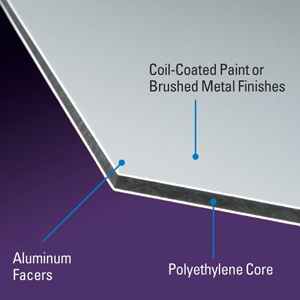
ACM Panels

Handmade Oil Painting on ACM Panels
|
| Benefits & Advantages of Painting on Dibond |
 |
|
There are benefits to using ACM or DIBOND panels as opposed to traditional woven artist canvases or other mediums such as paper, metal or wood. While there is also a likeness to still use traditional canvas, the growing popularity of using DIBOND can be attributed to a number of advantages:
| No primer/Gesso required |
ACM panels are unique in that gesso or primer is not required before painting. While primer can ensure better adhesion, the ACM's smooth and non-porous surface allows most oil paints, polyester paints, and waterborne acrylic paints to adhere very well when properly scruffed and prepped with alcohol. Primers may be added to elongate the life of the painting. |
|
| Longevity, Durability, & Rigidity |
Traditional linen stretched canvas can be subject to paint layers 'cracking' in the long run due to its flexibility. In addition, other factors such as primer, temperature, indoor/outdoor usage can affect the paint and the linen canvas overtime. As an alternate substrate, ACM panels are stable as a medium and offer long term durability and longer application life. Additionally, because of the ACM's rigidity, it can be hung using a hanging system and without additional backing and support. |
|
| Archivability & Application/Usage |
The quality of traditional linen stretched canvas can decrease overtime. Quality-made ACM panels such as DIBOND are made with archival-quality aluminum sheets which makes the panel highly archival and long lasting. Furthermore, this allows the panel to be suitable for both indoor and outdoor applications and ensures that the longevity and quality of the painting is not affected by moisture. |
|
| Weight & Pricing |
ACM panels are not only durable and rigid, but are lightweight compared to traditional linen canvas. DIBOND panels are some of the most lightweight panels available on the market, ranging in weight from 2.9-6.6 kg/m² for panel thicknesses between 2mm-6mm.
As a medium, ACM panels are relatively inexpensive. As a comparison, KeenART offers 4x8' cotton artist canvas with stretcher frames that range between $350-$620 USD. The price depends on the weight and the thickness of the stretcher bar frame. For canvases as large as 4x8', they would require a thicker stretcher bar frame and this would cost upwards of $400+USD. In contrast, KeenART offers a full 4x6' sheet of DIBOND panel for only $297 USD. Other ACM manufacturers price full 4x8' sheets to range between $250-$300+USD. |
|
| Framing, Hanging, and Mounting Systems |
 |
|
Hanging & Mounting
There are several options available if you would like to hang or mount your newly painted panel indoors or for outdoor/commercial display.
Indoor/Home Display
French Cleats
French Cleats are a hanging system in which mouldings are cut at a 45 degree angle and are secured by sliding the piece onto the other cleat. One cleat is attached to the wall and the other piece is attached to the artwork. As sawtooth hooks are
recommended for small paintings (12x8"), French cleats are ideal for ACM panel paintings that are larger (8x10" and larger) as they provide much more rigid support for heavier ACM panels. French cleats come in wood or metal moldings.
Stainless Posts
Another option to mount your dibond painting are stainless posts. Stainless posts are an ideal option for mounting acrylic mounts, however they are also a suitable option for mounting your ACM panel painting. Stainless posts are recommended for larger and heavier panels, as well as ACM panels that have more thickness. To assemble posts, align the painting to the wall and drill holes on all four corners of the panel. Insert the wall anchors and attach the screws through post barrels. Tightening the screw caps to secure the panel.
MDF Float Mount Hangers
Generally used for mounting wooden plaques or metal prints, MDF float blocks are a great option to mount your ACM panel. Rightfully named, float blocks or hangers give the artwork the illusion of "floating" off the wall. MDF Float mount hangers are recommended for medium-sized ACM panels (approx. 12x12", 14x18"). Wooden MDF float blocks are attached to the back of the panel (can be either attached with a strong adhesive glue or can already come with adhesive tape). The top MDF block will have a keyhole opening carved to allow the panel to rest on the nail.
Dibond Hangers
Similar to MDF float hangers, Metal Dibond Hangers are one of the best options for hanging your dibond painting. Like the french cleat system and the post hanging system, the metal hanger system is best recommended for larger and heavy duty dibond panel artworks. A thin steel plate is attached to the back of the dibond painting. For self-adhesive attachment, the adhesive is composed of a foam adhesive strong enough to support a large panel. Steel hangers will vary in size to accommodate for medium to large ACM panels.
We offers a variety of framing and hanging options for ACM panels. To learn more information about the different framing and hanging systems and which works best for each usage, check out our article on Hanging and Displaying Art.
|
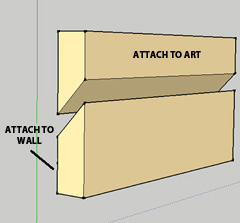
French Cleat Hanging System
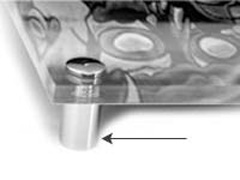
Stainless Posts
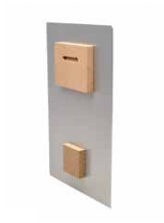
MDF Float Mount Hanger
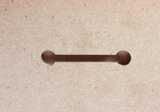
MDF Float Mount Hanger's Keyhole for Wall Display
|
| Application of ACM: |
 |
|
ACM are also commonly used in commercial and residential applications. Its rigid property serves as a key component for both interior and exterior application. These can be used as waterproof sheets for outdoor signage or indoor sheets for bathroom and kitchen. ACM can be modified and are used as a decorative element for hotels, offices, and shops. The smooth and shiny surface is commonly featured as modern design elements for cabinets and walls. ACM's lightweight/rigid property serves as a functional application for aircraft, and other means of transportation. These can be attached to almost any surface such as wood or metal. We use ACM panels for Plexi Face Mount backings.
For Art and Crafts, these boards can be easily custom cut into any shape and size. Also, both sides can be used simultaneously. Compared to stretched canvases, ACM are easy to store due to 1/8 inch thickness, and no stretcher bars or assembly time required.
|
| How to order ACM panel? |
 |
|
We offers Custom-Cut DIBOND Panels to jumpstart your next art project ! We can custom-cut DIBOND panels for as small as 4"x4" square and up to 96"x48" which is a full 4x8' panel sheet. We can guarantee a cutting accuracy of up to 1/8 of an inch. Currently, we only offer DIBOND panels in white and 3 mm thickness.
We also offers custom-cut DIBOND boards for our other services. Dibond panels can be used as a substrate for dry mounting, as a medium for fine art print mounting, and as a substrate for acrylic plexi mounting.
|
|
If you have questions about any of our services or products, don't hesitate to contact us. Our knowledgeable staff is always happy to assist with answers, advice, or suggestions.
|
|
© 2002-2025 - KeenART Media Ltd.
|
|
| |
|

